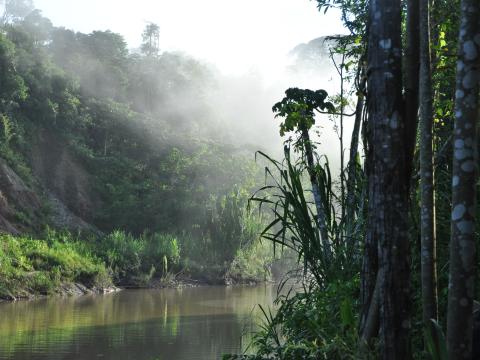CSF Highlights Key Economic Conditions for Scaling Nature-Based Solutions at Peru Carbon Forum 2025
LIMA, May 29, 2025 — At the Peru Carbon Forum 2025, Augusto Mulanovich, Director of Conservation Strategy Fund Peru, presented a comprehensive analysis on the financial and economic foundations necessary for scaling Nature-Based Solutions (NbS) in Peru. Speaking on the panel “Nature-Based Solutions (NbS) Projects for Peru: Ecosystem Conservation and the Carbon Market,” Mulanovich joined experts from government, business, civil society, and environmental organizations to explore the future of carbon markets in the region.
Mulanovich presented an economic and environmental analysis of the conditions necessary for NbS projects to be viable and impactful within Peru’s unique environmental and economic landscape. He underscored the importance of demonstrating project additionality—proving that emissions reductions or carbon removals would not occur without the intervention and its associated carbon finance. This, he noted, is essential for ensuring environmental integrity and market credibility.
He also addressed the volatility of voluntary carbon markets, warning that unpredictable carbon credit prices pose significant risks for project developers—especially in areas where opportunity costs of deforestation drivers like illegal mining or illicit crops are high. In such cases, carbon revenues alone often fall short, and strong government support becomes indispensable. As a result, many projects gravitate toward regions where potential carbon income can outweigh these competing pressures.
On the issue of carbon permanence, Mulanovich flagged the risk of future threats to forest cover, which introduced financial uncertainty. He pointed to emerging tools—such as Verra’s forthcoming risk map—as promising innovations to help assess these threats more accurately and adjust credit issuance accordingly, enhancing long-term credibility.
Legal clarity is another major concern. Mulanovich emphasized that in Peru, carbon rights are intrinsically tied to forestry laws and land-use authorizations. A lack of well-defined regulations around ecosystem services and carbon ownership—particularly in REDD+ contexts—can restrict project implementation and investment.
From a financial perspective, he stressed that successful NbS initiatives require significant upfront investments—for monitoring systems, personnel (e.g., forest rangers), and coordination with local communities. Since these projects often rely on pay-for-results mechanisms, funding is typically released only after emissions reductions are verified, not merely based on forest conservation alone.
To address these financial challenges, Mulanovich proposed diversifying funding streams. He recommended combining carbon finance with other sources such as sovereign green bonds, sustainable forest products (like Brazil nuts), ecotourism, and bridge financing during early project phases to improve resilience and sustainability.
The panel was moderated by Ángela Duque of BioCarbon Standard and included contributions from Juan Chang (Head of Global Operations, Permian Global), Nelson Kroll (Regional Manager, Maderacre), and Santiago Bermúdez (CEO, SBD Latam).
The forum was hosted by A2G Sustainability and Climate Change, in partnership with MÉXICO2 – Mexican Carbon Platform.
- Log in to post comments



